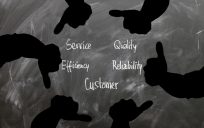Government web portals have transformed the way that government engages with constituents. Due to advancements in the private sector, constituents are now use to conducting basic services online. Portals can become the one-stop-shops to access government services. As more and more people leverage the web to interact with government, it is now expected that government agencies create easy to use, efficient and effective web portals. When done correctly, web portals will not only create happier customers, but also may lead to improved employee morale and cost savings.
Web portals are an essential tool for government agencies to explore. By creating new, innovative web solutions, government agencies can provide a higher level of services to constituents. A recent report from Hyland and the Center for Digital Government indicates some of the ways that government can potentially leverage a web portal:
- Assessor’s appeals for property taxes: Connect property records and assessment notices with an owner’s documentation in an online appeal case, visible to both the property owner and staff.
- Health and human services. An applicant can complete an electronic application and upload supporting documentation that can be shared among multiple programs for eligibility determination.
- Building development plans. Builders can upload plans and other required documents in an online permit file, which reduces lost documents and speeds permit processing.
- Meeting documents. Council and commission meetings and schedules can be posted in a portal, complete with agenda packets and access to previous minutes for easy public review.
- Local business documents. Licenses, registrations and filings can all be made through a business portal with all documents associated with the individual business account.
- Case management front end. For a case management system, a portal provides a consistent and convenient way for employees and clients to share information and track document submissions without the need for an in-person appointment.
These are just some of the numerous ways your agency could leverage a web portal. Yet, an essential component of creating a web portal is understanding the importance of turning traditional paper based processes into digital services. Once again, this is where the power of Enterprise Content Management (ECM) can come into play. For your web portal, you’ll need an engine to power the transactions and manage documents digitally. The key to your success may very well be understanding how you can leverage ECM to meet mission need.
There are many benefits of implementing an ECM system into a web portal. As you know, ECM is allowing government agencies to reduce monotonous tasks, and frees employees to work on more high-value and mission centric tasks. For instance, rather than manually entering organizational data from paperwork, organizing files, and physically delivering materials to coworkers, ECM allows automation of many of these time intensive processes. This frees government of the burden of paper and and allow employees to use their time efficiently, rather than focusing on document management tasks. ECM technology allows organizations to capture documents, process request, access documents and information anywhere, collaborate across your agency, and create metrics to help drive new business efficiencies.
There are simply some tasks that should be left to automation. Employees can still define rules and workflows, but removing the burden of document management tasks will only help to expedite processes, and deliver improved outcomes to stakeholders.
Now, imagine the possibilities when ECM is paired with a web portal. An efficient web portal must be able to turn traditional paper based processes into digital transactions. This means having the ability to automate, route, create forms, submit forms, and define the right workflows to route processes. An Enterprise Content Management (ECM) can assist government agencies in meeting these needs. The benefits of an ECM powered web portals includes:
- Streamlined service delivery to better improve government services
- Reduced error from paper-based processes
- Automated and route processes to enhance internal efficiencies
- Reduced costs and decrease overhead expenses for government
These benefits are just the beginning of what government agencies can expect to witness by adopting a web portal.
Want More GovLoop Content? Sign Up For Email Updates
 |
OnBase is a proven enterprise content management solution for each level of government, helping each meet today’s challenges of smaller budgets and staffs while laying the foundation for simplified, efficient and mobile government information technology. To learn more, visit Hyland’s resources page on GovLoop. |




Leave a Reply
You must be logged in to post a comment.